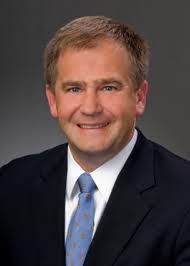Things are sure to get interesting in the debate over raising the federal minimum wage after today’s press conference from Rep. George Miller (D-Calif.) and Sen. Tom Harkin (D-Iowa). The two lawmakers will introduce legislation to gradually raise the federal minimum wage to $10.10 per hour and to make the federal tipped wage 70 percent of the minimum wage, up sharply from its current $2.13 per hour.
Some industry groups like the International Franchise Association have registered their opposition to the measure when President Obama’s proposal was for $9, arguing that higher wages mandated by the federal government would hinder expansion and hiring.
 Jamie Richardson, vice president of corporate and government relations for White Castle, shared that view, adding that changes in the federal minimum wage also might cut into the Columbus, Ohio-based chain’s ability to offer its full-time staff other benefits.
Jamie Richardson, vice president of corporate and government relations for White Castle, shared that view, adding that changes in the federal minimum wage also might cut into the Columbus, Ohio-based chain’s ability to offer its full-time staff other benefits.
White Castle’s more than 400 restaurants aren’t just company-owned, they’re still family-owned, as the founding Ingram family controls the business and thus would feel the full brunt of labor cost inflation from higher starting wages. But White Castle does not manage its labor line to put in the least amount of money. Quite the opposite: The chain’s average hourly wage is $9.57, which is 32 percent above the federal minimum wage of $7.25 per hour, and all full-time employees are eligible for a defined-benefit pension, health insurance and profit sharing.
Richardson spoke to me last week about how a federal call to raise the minimum wage misses the nuanced efforts of companies like White Castle trying to do right by their employees and about why he thinks a minimum-wage hike could harm more people than it helps.
What is White Castle’s view of the proposal to raise the federal minimum wage?
For us, the most important investments we make are in our people, so any time there’s something artificial in that marketplace, it doesn’t benefit anybody, because it shrinks the pool of jobs. It seems like a noble idea: “Let’s raise the minimum wage.” A lot of times it’s good in an academic setting, but in the real world it makes it hard for us to create jobs, because it increases the price of creating employment.
Candidly, it makes it tougher to higher people in urban neighborhoods or rural areas where unemployment rates are the highest. For us, starting pay is important, but to artificially raise it in ways that don’t reflect market reality, that hurts people that might need it most.
The federal minimum wage was last raised in phases from 2007 to 2009. Are there any levers you pulled last time that are available to you again to make things workable?
Well, the biggest change from the last time the minimum wage was increased is the amount of uncertainty that impacts our business. The economy is still recovering, and with people not eating out as often, uncertainty with costs from the Affordable Care Act being implemented, and the toughest competitive environment in a long time because of commodity costs, it’s beyond a triple threat. There are so many things we can’t control — commodities being one of them — that makes us ask why, in this environment, would we want to put on the backs of job creators something else that makes it difficult.
That’s the big thing that’s changed since 2006, the last time this was debated: We’ve gone through one of the toughest downturns since the Great Depression, so it raises the stakes of what we offer as starting pay.
Is there any possible silver lining if the proposed wage hike became law? Indexing it to inflation could mean we never have to debate raising it again. Might more quick-service customers have more money to spend at White Castle if their wages are higher?
A smaller number of those people fortunate to land a job would have a higher starting wage, but once somebody’s been employed for a certain amount of time, they reach a level higher than [the current minimum] wage. More people would remain unemployed for longer.
To achieve the greatest good for the greatest number of people, we’re not served well by raising the minimum wage. A lot of people would be much worse off, because employment that could come roaring back won’t.
Absent raising the federal minimum wage, what could or should be done for lower-income restaurant workers in the near term?
What we would offer from our own experience is that it’s not just about the pay. Most of our team members’ commitment is just as much about the other benefits we provide. We have defined-benefit pensions, holiday bonuses and profit sharing. We don’t like having our hands tied [by rising federal minimum wages], because it’s more difficult to have that conversation with our “hamburger heroes” behind our counters.
We think we have great engagement: 27 percent of our team members have been with us 10 years or more.

